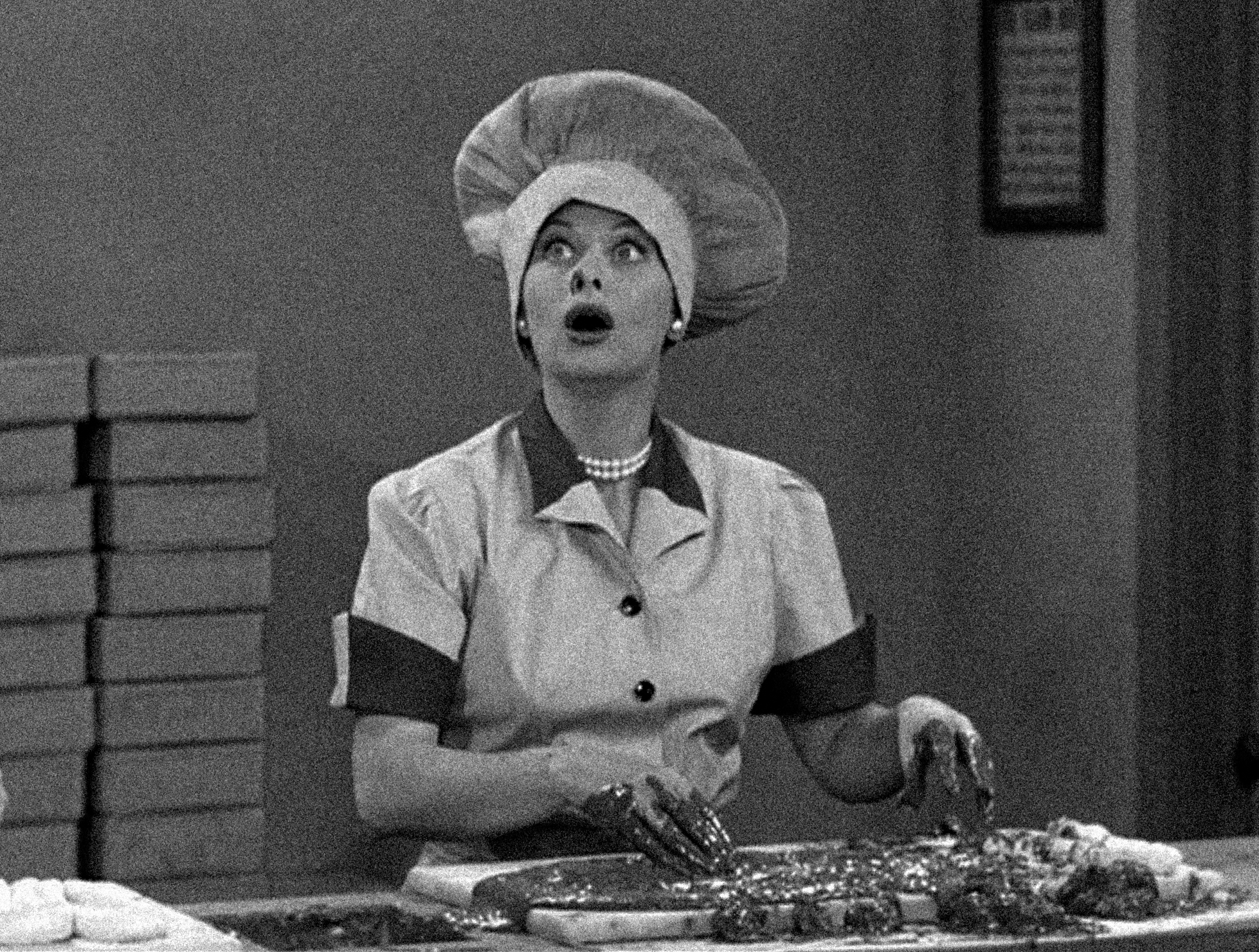“Lucy and Ricky go to an Italian vineyard, and they stomp grapes.” When Madelyn Pugh (played by Alia Shawkat), a writer for I Love Lucy, explains this premise to Lucille Ball (played by Nicole Kidman), the camera slowly zooms in on Ball, lost in thought about how to create her show, I Love Lucy. While the writers squabble about how to set up the slapstick sequence, Ball envisions herself stomping on the grapes and rolling through them, a black-and-white recreation of one of the original show’s most famous scenes. Kidman delivers a rubber-faced imitation of Ball’s giant facial expressions and exaggerated movements.
But while the film’s studio audience laughs along, it isn’t funny at all.
Being the Ricardos (2021), writer-director Aaron Sorkin’s new film about the production of Ball’s 1960s hit television show, aims to take viewers behind the scenes about what it was like to be Lucille Ball and Desi Arnaz (played by Javier Bardem). Kidman and Bardem have undeniable star presence, as they command a physicality (especially Bardem) that makes them entertaining to watch.
That said, neither Bardem or Kidman are comedy actors, and their interpretations of the scenes feel rote and by-the-numbers, with few of the performance quirks that make the original show hysterical. This may match Sorkin’s vision for the film, as he has said in interviews that he doesn’t think I Love Lucy, a show renowned for being funny, is actually humorous from a modern perspective. Of course, it would be possible to successfully create a Lucille Ball movie where the character was completely serious, but Sorkin’s movie—and Kidman’s performance—feel rudderless.
Being the Ricardos is so fast-paced, so thematically unfocused, and so unconcerned with Lucy’s humor that it gives her no dimensional backstory or interiority for Kidman to play. As a result, her performance is mimicry without hitting at a deeper truth found within it.
The flatness of Kidman’s performance in Being the Ricardos and Sorkin’s disinterest in her character development is going largely unrecognized by critics and members of awards groups. In fact, quite the opposite: Kidman has been nominated for several major awards and has won the Golden Globe for Best Actress (Drama) for the film, making her an Oscar frontrunner. Kidman’s frequent nominations are a sign of a dispiriting trend among awards bodies that begins to award impersonations over performances.
Over the past decade, Oscars voters have continued to nominate actors who play celebrities, frequently in biopics: In the past five years, Gary Oldman, Rami Malek, and Renee Zellweger have won for rote, by-the-numbers interpretations of Winston Churchill, Freddie Mercury, and Judy Garland, respectively. While some biopic performances can be compelling if they find an emotional truth or passion in the character, many of them are labeled as “Oscar bait”: meant to evoke a memory of another person rather than create a vibrant character of their own.
Some of this award season’s biopics are effective or have great performances, typically created by maximizing one element of the character. Andrew Garfield brings a fiery intensity to his portrayal of Jonathan Larson in tick… tick… BOOM! (2021), while Lady Gaga chews the scenery to an enjoyable degree in House of Gucci (2021). Jessica Chastain’s performance as televangelist Tammy Faye Bakker in The Eyes of Tammy Faye (2021) is so cartoonishly outsized that it quickly goes off the rails of humanity and begins to resemble a space alien (this is a compliment, as it’s never short of compelling).
Nevertheless, biopics and the performances they showcase can symbolize the opposite of quality for some critics and film fans; so many of the high-profile ones are mediocre drabs, more concerned with merely mimicking how a person really was rather than giving an individually passionate or outstanding performance. Critic Bilge Ebiri compares the biopic to “the comic-book movie of awards season,” both due to their unceasing ubiquity and predictable structures.
The biopic carries an indifferent quality that, at its most frequent, focuses so much on successive events rather than thematic feeling that it resembles a bad history textbook. There are certainly good performances in Being the Ricardos—the film’s subplot about women’s perspectives in the television industry is thought-provoking, led by Nina Arianda and Alia Shawkat. But the film breezes through a mostly invented account, condensing historical and ahistorical events into a single week and turgidly flashing backwards and forwards to pad the runtime. The filmmakers could have picked one aspect of Lucy’s personality or life story and fine-tuned the performance around that. Instead, Sorkin follows the rule of biopics in trying to cover it all, leaving little room for Lucy as a character to grow in the way a person does.
The major awards bodies make many great choices, but the toxic quality of “Oscar buzz” locks voters into picking biopics that get talked about simply because they are biopics when they premiere. None of the Parasite (2019) performers were even nominated for Oscars, but predictable, boring biopics like Harriet (2019), The Two Popes (2019), and Bombshell (2019) were able to shove their way in among the good films in 2020.
Movies like King Richard (2021), a boring biopic about Richard Williams, played by Will Smith, and Belfast (2021), an admittedly entertaining historical movie that has Big Biopic Energy, in this year’s awards-season cycle are talked about for months and considered locks for major categories, even without box office success or rave reviews. It is true that most critics enjoy King Richard and Belfast and that award nominees don’t need to do well at the box office, but the constant nomination of these “safe” movies and performances generates a sameness that can make catching up on nominees feel like a chore.
Perhaps one year, the Academy should be forbidden from selecting biopics and “based on a true story” movies; actors would then be incentivized to make performance choices that are weirder, personal, daring, and above all, more entertaining. Instead of a restrained and muted Lucy and Desi, there should be more love for performances pushing boundaries, acting boldly, and inhabiting a personhood, whether real or fictional, that feels truly human.





